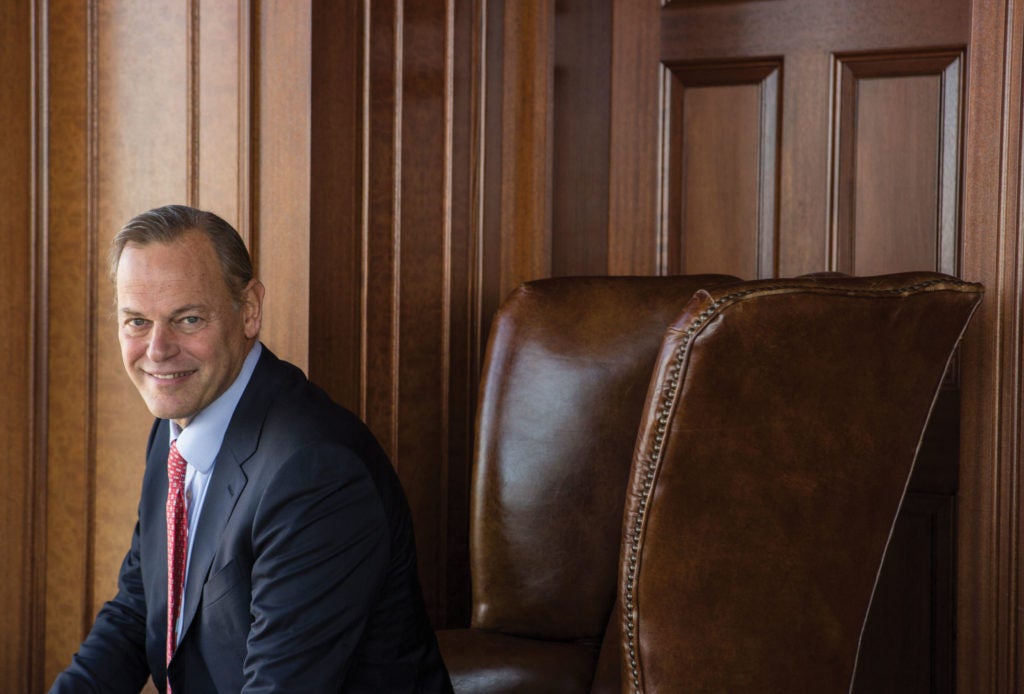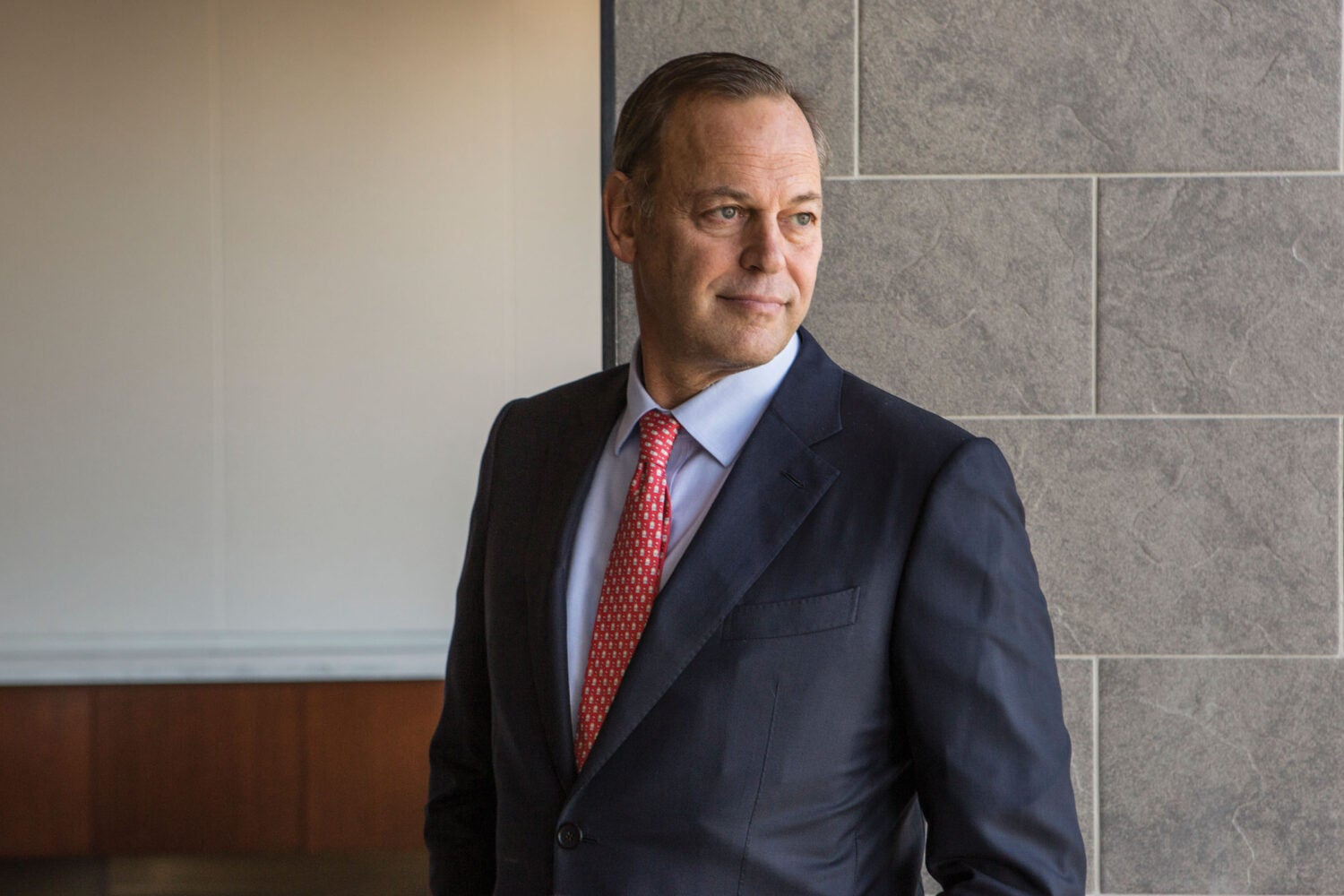Starting and growing successful businesses, and devising solutions to some of the toughest problems in public and higher education, have more in common than may appear at first blush. Both require creativity, and both offer the opportunity to better the lives of other people, says Steve Klinsky ’81.
Around 38 years ago, Klinsky co-founded the first private equity group at Goldman Sachs. He then went on to be one of the original five partners of the pioneering PE firm Forstmann Little. In 1999, he left to start his own private equity firm, New Mountain Capital, which now oversees more than $20 billion in assets and where he serves as CEO. For the past 25 years, Klinsky has also been deeply involved in education reform. In 1993, he established the Gary Klinsky Children’s Centers after-school program in some of the most disadvantaged public elementary schools in New York City. Those centers, created in memory of his deceased older brother, Gary, have now served thousands of children as part of one of the longest-lasting and largest public-private partnerships in the city’s schools. In 1999, he took time away from his traditional career to write the application for and organize the very first and longest-surviving charter public school in New York state—the Sisulu-Walker Charter School of Harlem—in partnership with famed civil rights leader and Harlem minister Dr. Wyatt Tee Walker. That story was told by Mary Bounds in her book, “A Light Shines in Harlem,” which won the Phillis Wheatley Book Award.
Klinsky likens Modern States, the philanthropy he launched, to a “digital public library of higher education.”
Today, Klinsky has taken on the issue of making higher education more affordable through a philanthropy he conceived of in 2012 and publicly launched in 2017, the Modern States Education Alliance. Modern States, which Klinsky describes as “like a digital public library of higher education,” is now the largest free college program for credit in the nation, with more than 175,000 registered users. Through its website, ModernStates.org, the charity offers free state-of-the-art online college courses from top university professors, free online textbooks and course materials, and full reimbursement for the College Board’s College-Level Examination Program (CLEP) exams. Students who take the free Modern States courses and then pass the CLEP exams can enter college with credit for those courses in hand, and save up to a year or more of traditional college time and expense, at more than 2,900 colleges and universities. “Even if only a few percent of all courses are taken this way,” says Klinsky, “it could save families and taxpayers a tremendous amount of money because the problem is so big.”
Student debt in the U.S. now totals over $1.5 trillion, and college education for credit is one of the only forms of information that has not become less expensive with the internet, says Klinsky. About 5 million college students (or 30% of all students) already take their courses online, but they generally pay the same high price for the courses as students who study on campus. Free online college courses available before Modern States did not have a path to credit. As he was developing the ideas behind Modern States, Klinsky specifically wanted to solve the “for credit” issue, making the courses truly useful for students and giving them a path into the traditional college system.

Klinsky, who serves as chair of the advisory committee of Harvard University’s Program on Education Policy and Governance (a position previously held by Jeb Bush), began by going to Washington and trying to change the accreditation system itself but hit a political dead end. He then turned his attention to the idea of using the College Board exam system as the credit mechanism. A public school kid from Michigan, Klinsky had himself graduated from the University of Michigan in just two and a quarter years instead of four, in part by using College Board Advanced Placement exams for credit. Ultimately, he decided the simplest and most practical answer was to combine the power of great, free online courses (which had to be produced only once and could then be used by an unlimited audience online at no extra cost) with reimbursed (i.e., free) credit-bearing exams. He focused on the CLEP exams, which have been widely accepted for credit for 50 years but can also be taken by anyone of any age on any day, in contrast to the AP tests, which can be taken only by high schoolers during the month of May.
There are CLEP exams in 32 subjects, ranging from college algebra to chemistry to Spanish. The 2,900 schools that accept CLEP for credit include most major state universities (such as SUNY, Ohio State, Penn State, and Texas State) as well as private colleges (such as Morehouse) and community colleges. Klinsky and his team spent over two years producing a full library of new college courses that were “reverse-engineered” to cover all the material needed to pass the CLEP, including free online textbooks and practice questions from the College Board. Modern States hired “the best college professors we could find to teach a state-of-the-art course in each of the CLEP subjects,” he says, from schools including Johns Hopkins, Columbia and Purdue. Modern States also offers AP courses in partnership with edX, the online learning platform founded by Harvard and MIT. Each Modern States course taken and passed can save a student and their family up to $2,000 in traditional college costs. Meanwhile, the charity has no marginal cost except the test fees, and no taxpayer dollars are needed.
Klinsky and Modern States have now paid for about 30,000 CLEP exams, saving students $30 million or more in traditional college course costs. The pass rate for the CLEPs at Modern States has been about 75%, well above the national average. Other users of the site may have paid for the exams themselves, or simply used ModernStates.org like a supercharged, professor-taught version of Khan Academy. University systems like SUNY and Texas State have become allies of Modern States as a way to enhance their own affordability efforts, and foundations like the Starr Foundation have joined the alliance as well. The Modern States materials can be used for free by anyone, including students in public school systems. The Heckscher Foundation for Children has partnered with Modern States to provide funds to New York City public schools in Harlem and the Bronx to facilitate adoption of the courses and tests. In New Orleans and elsewhere, some high schools are using the program so students can graduate from high school with college credits in hand. The military is offering Modern States to service members. Klinsky believes that the same paradigm of free online courses plus credit-bearing exams might also one day be expanded to reduce the cost of very expensive vocational courses and other high-cost job training.
Klinsky has been blazing paths throughout his career. The first leveraged buyout of a publicly traded company occurred in 1979 while he was at Harvard, where he received both an M.B.A. from the Business School and a J.D. from the Law School through the joint J.D./M.B.A. program. He wrote his thesis about the newly emerging private equity field. When he co-founded Goldman Sachs’ private equity group and joined Forstmann Little, there were only about 20 private equity firms in the world. Today, there are 5,000 firms owning 15,000 companies, and Klinsky speaks for his industry as chair of the American Investment Council.
Klinsky and New Mountain Capital were also innovators with New Mountain’s “social dashboard,” which tracks the firm’s social metrics, including job growth in its portfolio companies, in reports that the firm has compiled and published on its website since 2008.
At New Mountain, as of 2019, says Klinsky, “we’ve added or created over 43,000 jobs at our private equity portfolio companies, net of any job losses. We pay way more than the national average. We have spent over $4.6 billion on R&D, software and capital expenditures. We have generated around $35 billion of gains for workers’ pension plans and other shareholders. We have never had a private equity bankruptcy or missed an interest payment.”
“I am a big believer that business is a very socially positive act if done right.”
“I am a big believer that business is a very socially positive act if done right,” he says. “If you do a great job, you’re finding better ways to fulfill the needs of thousands, or even millions, of people, in every area from life science supplies to information. Whether an organization is for-profit or not-for-profit, it all comes back to the same act of combining people, ideas and things together in a better way to meet the needs of others.”
New Mountain’s private equity arm currently owns and directs over 30 companies, with over 60,000 employees, and has formal social improvement “ESG” (environmental, social, and governance) plans in place at each company. Last May, New Mountain executed a $4 billion IPO for its Avantor life sciences company, which was the largest health care-related IPO in history and the second largest IPO of the year after Uber. New Mountain originally acquired Avantor for $290 million in 2010, and it is valued at approximately $14 billion today.
In 2013, Klinsky and his wife, Maureen Sherry Klinsky, former managing director at Bear Stearns and a bestselling novelist under the name Maureen Sherry, endowed the Steven and Maureen Klinsky Professorship of Practice for Leadership and Progress, the first endowed professorship of practice at HLS. Their goal is to bring visiting professors from a wide range of fields to campus to inspire and broaden perspectives. Cardinal Timothy Dolan, the archbishop of New York, gave the inaugural lecture.
“The professorship is a chance to widen the aperture of what law means,” says Klinsky, who serves on the HLS Dean’s Advisory Board. “I am so proud and happy to have been accepted to HLS years ago, and I have received tremendous benefit from my legal education even if I don’t have a traditional legal career. My whole life has been cross-discipline, and the professorship can help others at the Law School do the same.”
